- About Ramapo
- Academics
- Admissions & Aid
- Student Life
- Athletics
- Alumni
- Arts & Community
- Quick Links
- Apply
- Visit
- Give
From Algorithms to Action: How AI is reshaping leadership and democracy
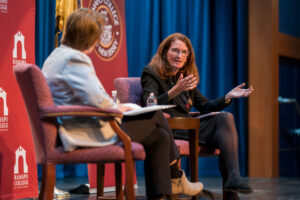
A fireside chat with Lieutenant General (ret.) Mary A. Legere, managing director for Accenture Global Defense, kicks off the 2024 Presidential Speaker Series
October 31, 2024
by Liz Mendicino ’26
Last year, Ramapo College began examining artificial intelligence (AI) to understand the challenges and opportunities the technology poses for the present and future on campus and, more broadly, in higher education. As a part of this endeavor, which has included teaching circles and classroom and administrative unit conversations, the first installment of the 2024 President Jebb’s Presidential Speaker Series welcomed LTG (ret.) Mary Legere to share her insight in her talk: The Implications of Artificial Intelligence on Leadership and Democracy. This fireside chat with President Cindy Jebb gave the campus community a unique opportunity to gain insight from Legere, whose impressive vitae includes leading intelligence, security, and cyber organizations with the U.S. Army and serving as the managing security director for Accenture Global Defense. Legere was uniquely positioned to share her expertise with the students, staff, and faculty.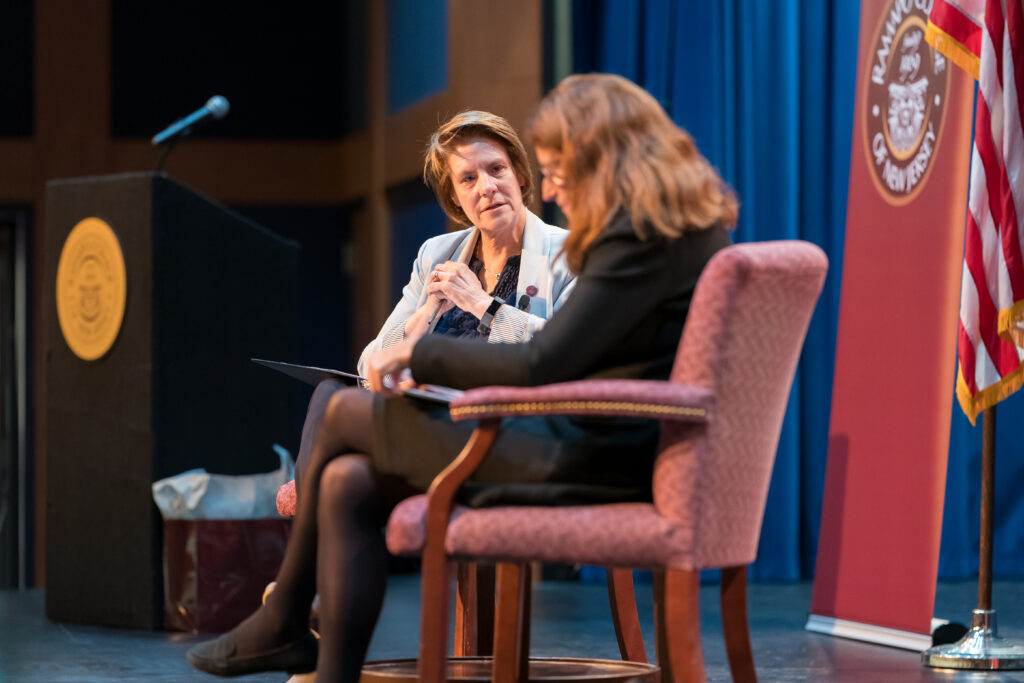 President Jebb opened the conversation by introducing Legere, whom she has known for more than 40 years, on stage to a captive audience. After exchanging friendly quips about how long they have known each other, Legere shared the journey that led to her decision to join the ROTC, ascend the ranks in the U.S. Army, and land where she is today with Accenture.
President Jebb opened the conversation by introducing Legere, whom she has known for more than 40 years, on stage to a captive audience. After exchanging friendly quips about how long they have known each other, Legere shared the journey that led to her decision to join the ROTC, ascend the ranks in the U.S. Army, and land where she is today with Accenture.
“AI is probably the uber humanity.” – Lt. Gen (ret.) Mary Legere
Referencing an article that artificial intelligence could arguably be thought of almost as a humanities, Jebb asked Legere how she conceives of AI. “AI is probably the uber humanity,” Legere responded, explaining that AI is defined as simulating human processes by machines. At the core of it are brilliant people from a variety of academic disciplines who work at mimicking the human experience. “So AI by its very nature, is trying to help humans be better…I think it is very much a humanity. It is also ubiquitous.”
Legere added the caveat that responsibility is part of using AI and necessitates governance to avoid wrong conclusions. “For every positive thing about this age of AI, there is some dangerous or malicious or maligned use, and we all have to be aware and we all have to be part of ensuring that we use it for good.” This is especially true as a national security practitioner, as it is important to recognize that not if, but how adversaries will use AI against us.
Jebb asked about AI and disinformation in the current election season and shared that “Ramapo College has been investing its time on modeling and insisting upon civil discourse, yet this is not what we see demonstrated in many of our country’s storied institutions. In fact, incivility and polarization raise larger concerns about the health and stability of American democracy.”
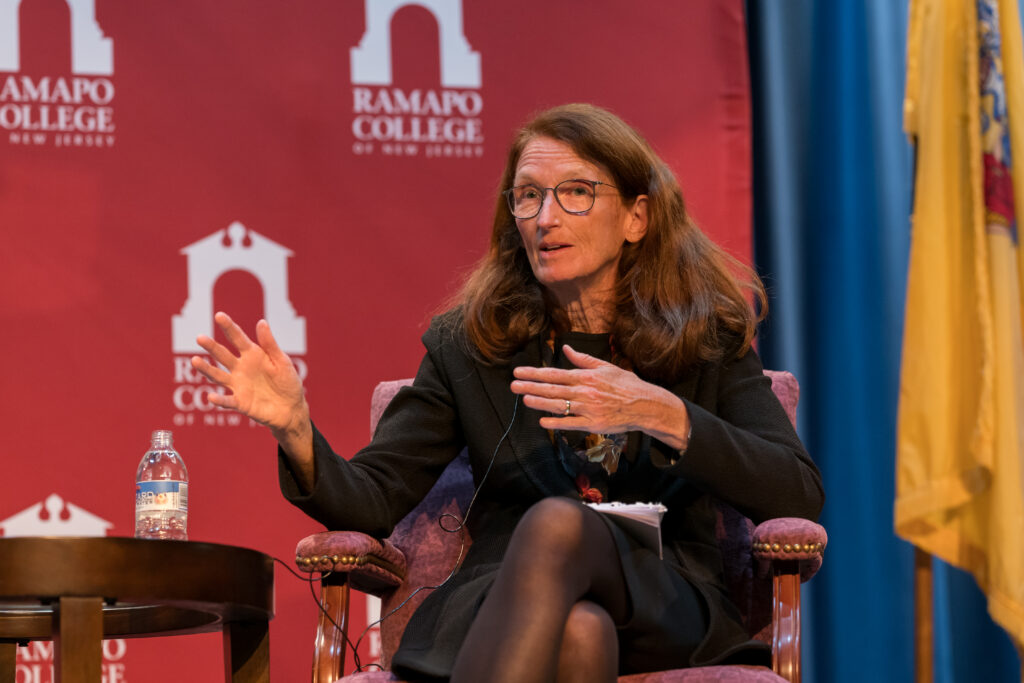 Legere, in turn, asked the audience to think about information they have consumed on social media that perhaps seemed off-point and flooding their feeds. She added that electoral processes in the U.S., NATO allies, and in the INDOPAC region have been and are being targeted by adversaries, and that democracies are countering disinformation and organizing to help monitor those efforts, using AI to track where it’s coming from and understand the sentiment analysis.
Legere, in turn, asked the audience to think about information they have consumed on social media that perhaps seemed off-point and flooding their feeds. She added that electoral processes in the U.S., NATO allies, and in the INDOPAC region have been and are being targeted by adversaries, and that democracies are countering disinformation and organizing to help monitor those efforts, using AI to track where it’s coming from and understand the sentiment analysis.
Prior to the Q&A with the audience, Jebb asked about integrating AI as a leader into different organizations, and asked Legere to share what she has seen throughout her career and if there are things leaders can do to prepare their organizations to adapt to the rapid advancements in AI technologies.
“AI is just the thing in this day and age that requires a transformative mindset by leadership to know that first and foremost, there is no way to opt out of the age of AI,” Legere said. Leaders need to become educated about it and be proactive so that their organizations and teams will not fail. “It begins with accepting that this is not someone else’s job.”
She also added that it is important to have buy-in and ensure team members have a voice. At Ramapo, this means speaking with students and faculty, and to select the high-impact aspects that will generate more and more interest by others on campus. 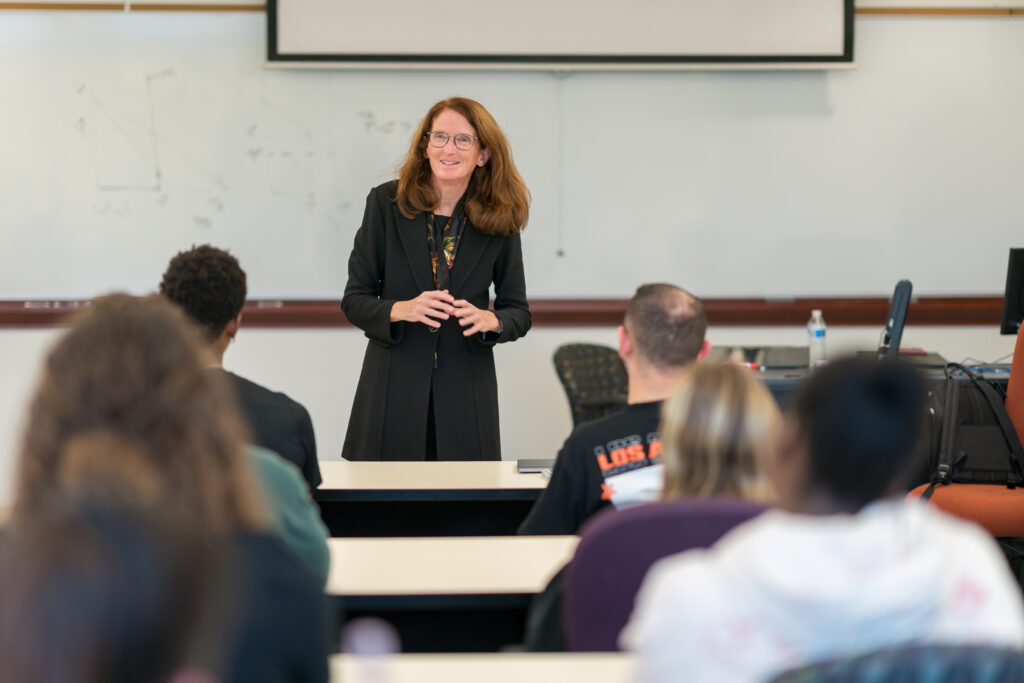 During Legere’s visit with Ramapo College, she spent time with students in World Sustainability and Strategic Management classes, as well as with community partners. In addition, she participated in an intimate roundtable discussion with student leaders from the Student Government Association, Data Science Club, Computer Science Club, Google Developers Clubs, Women in Business, ROTC, Ramapo Management Consulting Group, and Engineering Physics Club.
During Legere’s visit with Ramapo College, she spent time with students in World Sustainability and Strategic Management classes, as well as with community partners. In addition, she participated in an intimate roundtable discussion with student leaders from the Student Government Association, Data Science Club, Computer Science Club, Google Developers Clubs, Women in Business, ROTC, Ramapo Management Consulting Group, and Engineering Physics Club.
“Regardless of what you’re doing, you need to know how to communicate,” said Legere on her majors in political science and mass communications. “You also need to be able to evaluate and say to yourself; ‘What are my gaps and what friends can I make to fill them?’” She emphasized the importance of taking classes outside of one’s field to gain not only contacts in other areas of study that one can rely on, but additionally developing necessary, fundamental skills that different areas of study have to offer. She cited interdisciplinary teamwork as a fundamental aspect of her career and success.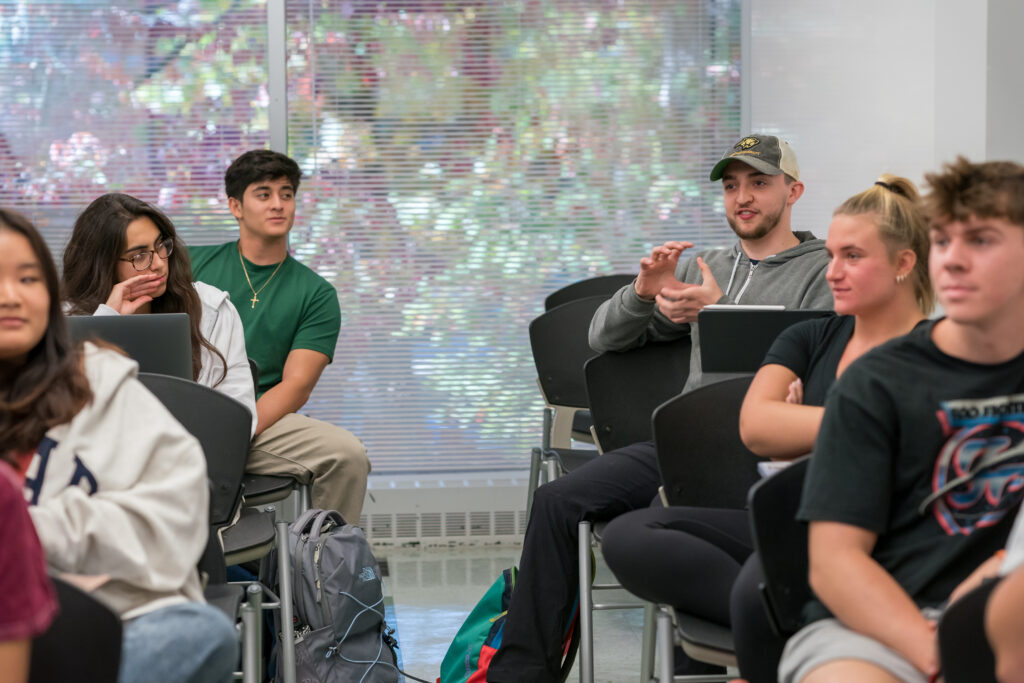
It is not on every college campus that a student can simply pass the college’s president walking with one of the most renowned intelligence and global defense specialists in the nation and stop to have a conversation, but at Ramapo, you can. It is one of the many reasons Ramapo is special. The College cultivates not only a culture of academic excellence, but one of comfort, accessibility, and familiarity.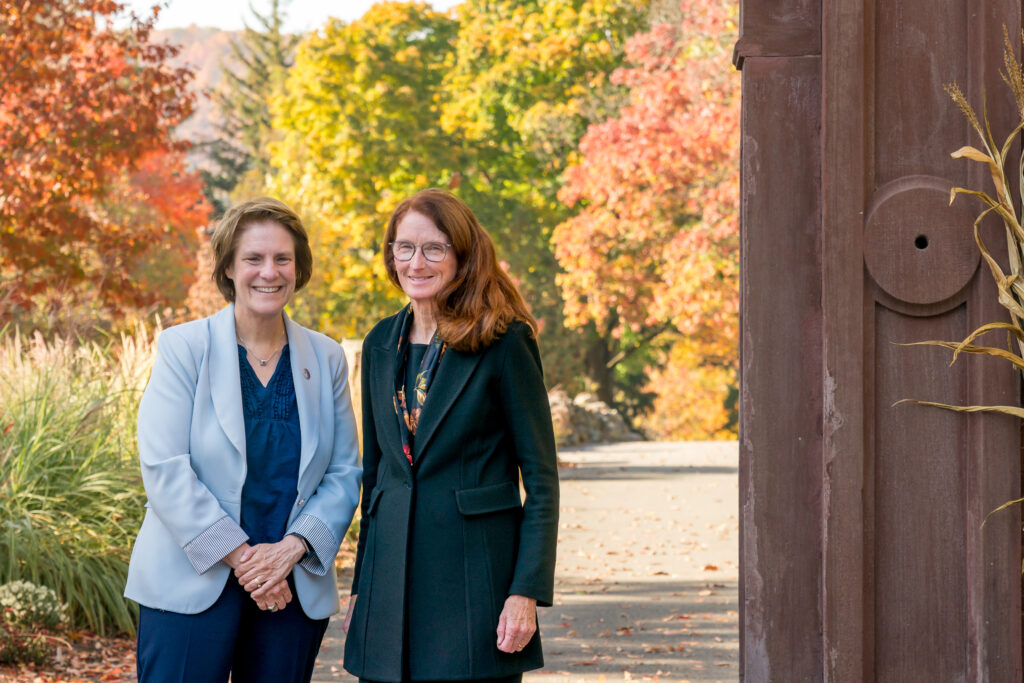 A recording of the fireside chat with Legere is temporarily available to the Ramapo community on the intranet.
A recording of the fireside chat with Legere is temporarily available to the Ramapo community on the intranet.
Copyright ©2025 Ramapo College Of New Jersey. Statements And Policies. Contact Webmaster.

Follow Ramapo